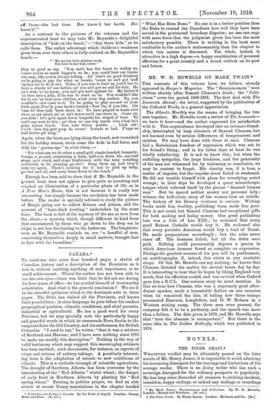MR. W. D. HOWELLS ON MARK TWAIN.* THE contents of
this volume have, we believe, already appeared in Harper's Magazine. The ".Reminiscences " were written shortly after Samuel Clemens's death ; the " Criti- cisms " cover the period 1869-1901. The first deal with The Innocents Abroad; the latter, suggested by the publication of the Collected Works, is a general appreciation.
The Atlantic Monthly was the means of bringing the two men together. Mr. Howells wrote a review of The Innocents— we have it here—and the author expressed his satisfaction with it. This acquaintance developed into an intimate friend- ship, interrupted by long absences of Samuel Clemens, but not harmed even by serious differences of temperament and opinion. We may have done with these at once. Clemens had a Rabelaisian freedom of expression which was not to his friend's liking ; and in his latter days at least he was wholly unbelieving. It is sad to know this ; but when the unfailing sympathy, the large kindness, and the generosity of the man are witnessed for by testimony so conclusive, we may be content to forget. His charity was, it is true, a matter of impulse, but the impulse never failed or weakened. He did not trouble himself with plans for remedying social wrongs ; in later days he developed a queer misanthropic temper which relieved itself by the phrase " damned human race." But he spared neither money nor personal help ; witness the half-comic story of the woman bent on suicide. The history of his literary ventures is curious. Writing books made him wealthy, publishing them made him poor. This is not usual, but Samuel Clemens had exceptional gifts for both making and losing money. One great publishing loss was a Life of Leo XIIL ; be reckoned that every good Roman Catholic would buy it. He reckoned alio that every patriotic American would buy a bust of Grant. He made preparations accordingly ; but the sales never came off. The business failed; but all the debts were paid. Nothing could permanently depress a genius in which American humour found so complete an expression. Perhaps the greatest success of his pen will be posthumous, an autobiography, if, indeed, this exists in any available shape. Of this Mr. Howells can say nothing ; he knows that Clemens dictated the matter for several hours day by day. It is interesting to hear that he began by liking England very much, that his affection cooled, and was revived when Oxford gave him a D.C.L. One curious story we must mention. In this we hear how Clemens, who was a supremely good after- dinner speaker, made a lamentable failure on one occasion when he conceived the idea of telling bow three tramps personated Emerson, Longfellow, and 0. W. Holmes in a Western mining camp. The three men were present, the company felt it to be a profanity, and the speech was more than a failure. The date given is 1879, and Mr. Howells says that "here the almanac is unimportant." But there is the same idea in The Golden Butterfly, which was published in 1876.


































































 Previous page
Previous page